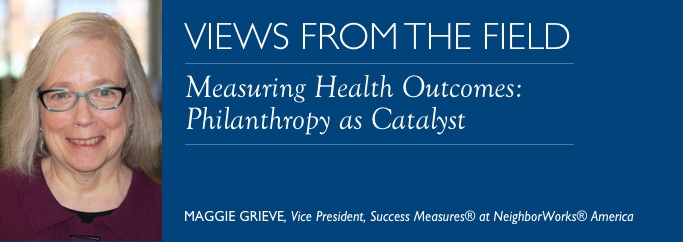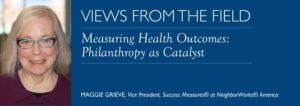
To what degree does a newly rehabbed apartment help decrease emergency room visits for an asthmatic child?
What are the barriers to improving community residents’ access to healthy foods?
How do neighborhood amenities and safety factors influence a family’s outdoor activities?
The answers to questions like these are increasingly sought-after by grantmakers and community-based service providers working to advance health equity and address the critical health needs in their communities. As projects and cross-sector partnerships that integrate affordable housing, community development, and health begin to scale, documenting the associated health outcomes is essential to gain an understanding of how these efforts address the key social determinants of health and to build the body of evidence needed to tailor interventions in communities.
The paradigm shift that has brought recognition of the social determinants of health to the forefront for grantmakers, health care institutions, and community development has been an important step toward improving community health and health equity. However, it is only the first step. With that recognition needs to come the corresponding investment that allows nonprofits and community benefit programs on the frontlines to measure the impact of their work on health outcomes. Clinical data or other large data sets that might be provided by partner health care institutions do not always answer the critical questions posed by community-based programs. New data initiatives, notably the 500 Cities Project, Community Commons, Opportunity 360, and the data platform within the 100 Million Healthier Lives Project, have the potential to help communities understand key health and related equity indicators. However, these data sets cannot substitute for the direct primary program-level data that are the foundation to understanding short- and mid-term changes in health attitudes, behaviors, and practices influenced by upstream interventions, and how investments in community-based initiatives are affecting the social determinants of health and the lives of people in vulnerable communities.
New Health Outcome Tools
Bridging community health and community development is a critical step toward reaching our common goal of creating stronger, healthier neighborhoods. However, measuring community development’s impact on health has been an ongoing challenge for practitioners and philanthropy working toward that goal. There have been many efforts to close the data gap, but few have resulted in common measures that can be replicated across geography and grantees. To help address these key issues, Success Measures®, an evaluation resource group at NeighborWorks® America, a leading national community development intermediary, has developed and introduced to the field a new suite of more than 65 data collection tools which help gather the primary-level data so badly needed to understand the on-the-ground effects on health of programs and investments. The Success Measures Health Outcome Tools, created with cross-sector experts and field tested across the country, help make evaluation feasible for organizations of many sizes, capacities, and program focus areas. Questions ask about an individual’s health status, beliefs, attitudes and behaviors; personal and community factors that influence health; access to health care services; and cross-sector collaborations between the community development and health fields. The process of developing these tools and the underlying approach incorporated into all of our work is that the success of an evaluation depends on a carefully focused, manageable effort that collects appropriate, understandable and useful data. From our work with hundreds of organizations over the last 12 years, we know full well that no organization has the time or resources for an empty exercise, but that most organizations with the appropriate tools and assistance can build their own capacity to conduct an organized and meaningful evaluation. Our new health tools are available in PDF format to all organizations.
Testing Ways to Build Capacity to Measure Health Outcomes
A national initiative, jointly designed and implemented by NeighborWorks America and Enterprise Community Partners, is using the new tools to help demonstrate and document health outcomes in low- and moderate- income communities. The Health Outcomes Demonstration Project is supporting twenty leading housing and community development organizations across the country through technical assistance, peer learning, and grants to design and conduct evaluations of an array of their ongoing programs. For example, several organizations are examining the health benefits of housing repair and weatherization programs, while others are looking at the health outcomes of food security programs, programs designed to enhance financial security, or onsite recreation and fitness programs in affordable housing properties. Cross-sector violence prevention and public safety efforts at the family and community levels are also among the programs organizations selected for evaluation.
Running through June 2019, this three-year project, funded by the Robert Wood Johnson Foundation, The Kresge Foundation, The Hearst Foundation, NeighborWorks America, Enterprise Community Partners, and the U.S. Department of Housing and Urban Development, and by in-kind support from the Federal Reserve Bank of San Francisco, will provide important insights into the effectiveness of programs for the 20 participating organizations. Moreover, these groups are gaining the skills and capacity to incorporate evaluation and the results into their work in an ongoing and sustainable way.
Grantmakers as Catalysts in Scaling Health Outcome Measurement
Ultimately, the lives of children, families, seniors, and communities will be enhanced if the right data is used in the right ways: gathered strategically and used productively to improve programs and target resources. Current efforts to accomplish this are small, but this is a pivotal moment where important new secondary data sources are becoming more accessible and new primary-level data tools are freely available. If health outcome evaluation and use of the new data sources can scale to ensure that investments are achieving intended results in vulnerable communities, it is possible to envision ripple effects across health care, public health, and public and private reimbursement streams. However, most organizations outside of the health sector, even those with some evaluation experience, need the targeted evaluation support that philanthropy can make possible to address conceptual, evaluation design, methodological, and resource issues in assessing health outcomes. With support, these organizations on the frontlines of community work are ideally suited to help move us toward more effectively addressing health equity and embracing a culture of health for all Americans.
Grantmakers can catalyze this potential by helping to scale health outcome measurement and enhanced use of the new data resources by:
- incorporating sufficient funding into program grants for grantees to measure health outcomes,
- helping grantees be more explicitly proactive about understanding the health outcomes of their community-based programs and encouraging them to develop realistic, feasible evaluation plans,
- ensuring that program officers develop local partnerships and resources to support grantee evaluation efforts,
- recognizing that primary-level program and community data need to be incorporated with secondary data to fully understand results,
- routinely sharing information with grantees about free data collection tools, including Success Measures Health Outcome Tools, PROMIS and other free or low-cost data sources: 500 Cities Project, Community Commons, 100 Million Healthier Lives Project, Opportunity 360, PolicyMap, National Neighborhood Indicators Partnership, and
- periodically looking across funding portfolios, using the new lens of grantee health outcome data, to reassess grantmaking strategies.

